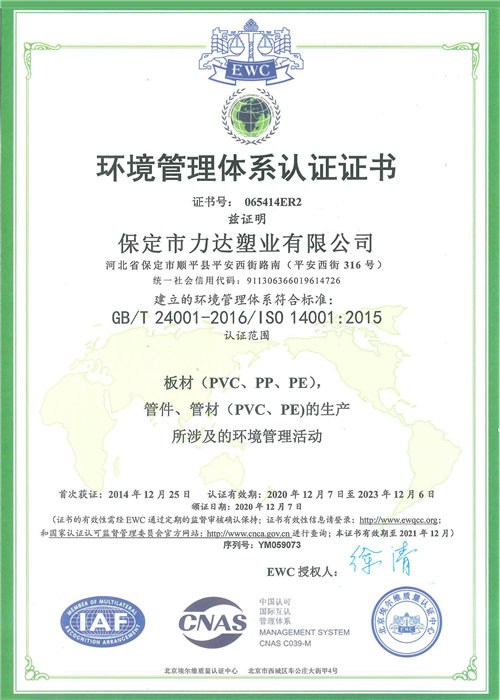វិច្ឆិកា . 10, 2024 19:27 Back to list
Understanding the Benefits of PPR Hot Water Pipe Systems for Modern Plumbing
Understanding PPR Hot Water Pipes Advantages and Applications
PPR (Polypropylene Random Copolymer) pipes have gained significant popularity in various plumbing applications, particularly for hot water systems. Known for their durability and resistance to corrosion, PPR pipes provide an efficient solution for transporting hot water in residential, commercial, and industrial settings. This article explores the benefits and applications of PPR hot water pipes, highlighting why they are a preferred choice among builders and plumbers.
Advantages of PPR Hot Water Pipes
1. Durability One of the most notable features of PPR pipes is their exceptional durability. Made from a high-quality polypropylene material, PPR pipes are less prone to cracking and breaking compared to traditional materials like PVC or metal. This durability ensures that they can withstand high temperatures and pressures, making them an ideal choice for hot water supply systems.
2. Temperature Resistance PPR pipes can handle temperatures of up to 95 degrees Celsius, making them suitable for hot water applications. Their ability to maintain structural integrity under high thermal conditions means they won't warp or deform, ensuring a reliable supply of hot water.
3. Corrosion Resistance Unlike metal pipes, which can corrode over time, PPR pipes are resistant to rust and scaling. This prevents blockage and reduces maintenance costs over the pipe's lifespan. The smooth inner surface of PPR pipes also minimizes the buildup of sediment, ensuring a consistent flow of hot water.
4. Lightweight and Easy to Handle PPR pipes are significantly lighter than their metal counterparts, making them easier to transport and install. The lightweight nature reduces labor costs and installation time, contributing to overall project efficiency.
5. Eco-Friendly PPR pipes are made from recyclable materials, contributing to a more sustainable approach to plumbing. Their non-toxic nature means they do not leach harmful substances into the water supply, which is essential for maintaining potable water quality.
ppr hot water pipe

Applications of PPR Hot Water Pipes
PPR hot water pipes can be used across a wide range of applications, making them versatile for different plumbing needs
1. Residential Plumbing In households, PPR pipes are commonly used for hot water distribution systems, supplying hot water to bathrooms, kitchens, and heating systems. Their reliability and efficiency ensure that families have consistent access to hot water.
2. Commercial Buildings PPR pipes are widely used in commercial buildings, such as hotels, restaurants, and office complexes. These facilities require efficient hot water systems to cater to high demand, and PPR pipes offer the ideal solution for such requirements.
3. Industrial Applications In industrial settings, PPR pipes are utilized in various processes that involve transporting hot liquids and gases. Their ability to resist corrosion makes them suitable for chemical applications, where traditional materials may fail.
Conclusion
PPR hot water pipes offer a myriad of advantages, including durability, temperature resistance, and eco-friendliness. Their versatile applications in residential, commercial, and industrial settings highlight their importance in modern plumbing systems. As the demand for efficient, durable, and sustainable plumbing solutions continues to grow, PPR pipes stand out as a reliable choice for hot water supply needs. With ongoing advancements in technology and materials, PPR pipes are set to remain at the forefront of plumbing innovation for years to come.
-
High-Precision PVC Rigid Sheets for Vacuum Forming | AI-Optimized
NewsAug.05,2025
-
Durable PVC-M Water Supply Pipes | 60-Year Life
NewsAug.04,2025
-
Premium HDPE Water Supply Pipes: Durable & Leak-Proof
NewsAug.03,2025
-
Premium PVC-M Water Supply Pipe - Durable & Efficient
NewsAug.02,2025
-
Premium PP Welding Rod: GPT-4 Turbo Enhanced
NewsAug.01,2025
-
HDPE Drainage & Irrigation Pipe - Durable, Efficient Solutions
NewsAug.01,2025

